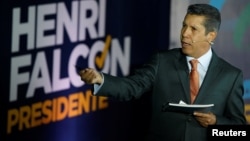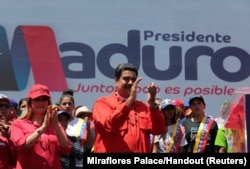Venezuela's President Nicolas Maduro kicked off his presidential campaign giving away trash trucks and tractors while challenger Henri Falcon laid out plans to de-politicize state oil company PDVSA and dollarize an ailing economy.
Turnout at the May 20 election is expected to be low given Venezuelans' depression over an unprecedented economic meltdown and a boycott by the mainstream opposition which views the poll as a farce intended to legitimize autocracy.
Though some polls have put him level or even ahead of Maduro, abstention would hit the 56-year-old former soldier and governor Falcon harder than the socialist incumbent.
More than 80 executives at PDVSA, or Petróleos de Venezuela, S.A., and its suppliers have been jailed in recent months for alleged corruption.
Tensions between PDVSA, which provides Venezuela with some 95 percent of export revenue, and foreign oil companies has risen as military officers who have little or no oil industry experience are given senior roles.
Falcon and Wall Street heavyweight Francisco Rodriguez, his chief economic adviser, laid out plans to reform PDVSA, separating it from the oil ministry, asking the Organization of the Petroleum Exporting Countries to raise quotas and strengthening the role of foreign partners.
Underlining the difficulty of Falcon's task, other opposition activists were organizing rallies this week to promote abstention at next month's vote.
Unlike past campaigns, rallies on both sides have so far been poorly attended.
"There are many difficulties, yes, but who is going to overcome them? The oligarchy, Donald Trump, or us?" said Maduro, 55, speaking in the city of San Felix, in the southern state of Bolivar, where he gave vehicles to local authorities.
Maduro, the successor to Hugo Chavez, has roughly 20 percent core support and is expected to win given the state's formidable election apparatus, a political ban on the opposition's two top leaders, a compliant election board, and the poor's dependence on welfare policies including food handouts.
Millions earn the equivalent of barely $2 a month, suffer shortages of basic food and medicine, and face annual inflation in the thousands of percent.
"Venezuela Doesn't Work"
Falcon described the crisis as the worst in Latin American history, as he was flanked by Rodriguez.
The pair plan to dollarize Venezuela's economy, replacing the bolivar, which has weakened over 99 percent against the dollar since Maduro came to power. Some independent economists, however, see that as unfeasible.
"Hunger is Venezuelans' biggest day-to-day problem," Falcon said, lambasting Maduro for incompetence.
Various foreign government have threatened to not recognize May's election given democratic shortcomings, and the United States is considering oil sanctions against Venezuela afterwards.
"Venezuela doesn't work and that's what we want to change," said Rodriguez.






